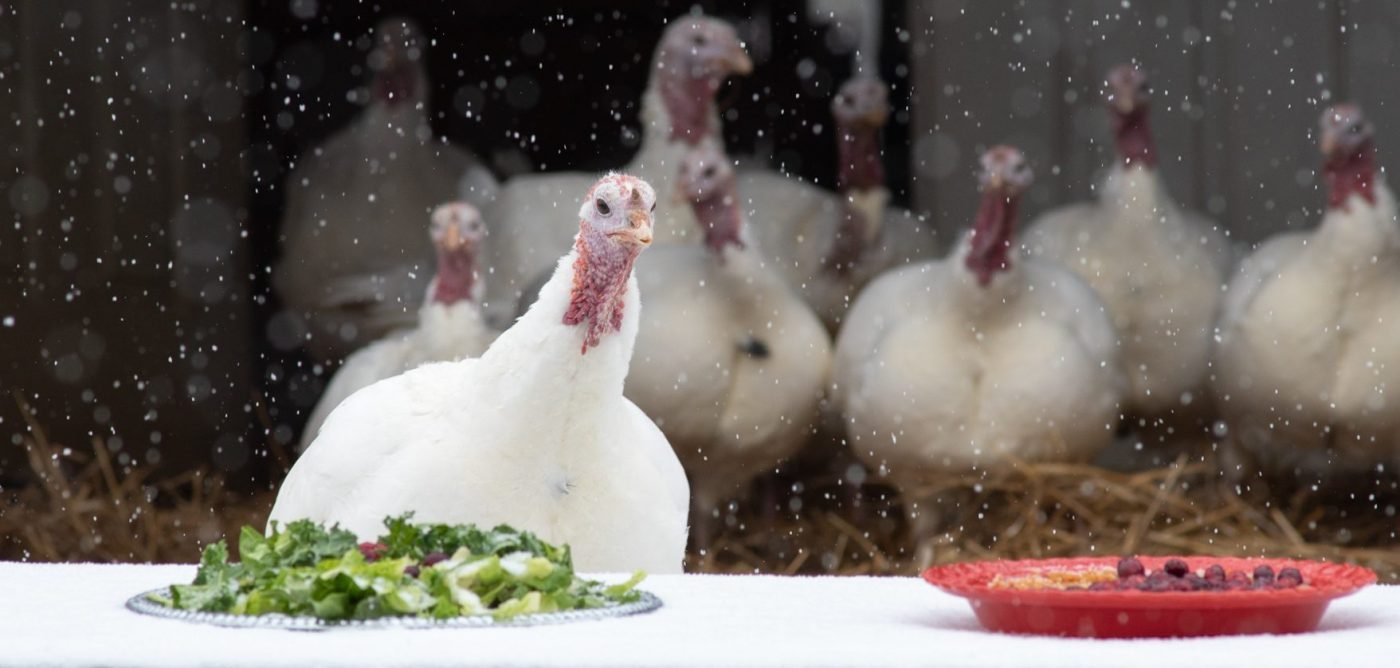The Power Of Sanctuary is an event for believers in the possibility of a just and compassionate food system and the need for systemic change.
Our virtual 35th Anniversary Event is here!
Watch Now

Transcript
The true cost of cheap meat, eggs, and dairy is catching up to us. The system is flawed, causing a world of harm that can no longer be ignored, starting with the 80 billion animals slaughtered worldwide for food each year. When we imagine a farm, we envision the idyllic world we show our children in picture books with big red barns and imaginary barn yards, where chickens roam and pigs bathe in big, muddy puddles, or the rolling green pastures shown in meat and dairy advertising, where herds of cows graze happily in the sunshine. But this isn't reality.
Most animals raised for meat, dairy, or eggs in the US are born into a factory farming system, where large numbers of animals are kept indoors and out of sight, packed into cages, pens, or warehouses as tightly as possible for the greatest profit. They endure unimaginable suffering, and much is hidden from the unsuspecting public by agriculture gag laws designed to silence would be whistleblowers by punishing them for recording footage of what goes on in animal agriculture. In the United States, 99% of the 10 billion farmed land animals live in confined, unsanitary, oppressive conditions that we call factory farms.
And these so-called farms are destroying our fragile planet. Global animal agriculture is responsible for 30% of our freshwater footprint and covers nearly one half of Earth's usable ice free land. And a devastating 80% of deforestation in the Amazon serves cattle agriculture.
Today, 60% of mammals on Earth are livestock, predominantly cattle and pigs. 70% of all birds on Earth are farmed poultry. Just 4% of all mammals are wild. The dire imbalance of life on Earth has become tragically clear. We live in the sixth mass extinction.
At its growth rate, animal agriculture will be responsible for 80% of the entire world's carbon budget by 2050. Animal agriculture's current worldwide emissions are greater than the entire transportation industry combined. It's not a future problem for others to solve. The time to act is now.
Our public health is in peril at the hands of the factory farming system. Factory farms are a breeding ground for disease, including emerging pathogens and virulent strains of antibiotic resistant bacteria. The Centers for Disease Control and Prevention warns three in four emerging human diseases come from animals, and the methods used in factory farms are already recognized as important risk factors for zoonotic outbreaks, making the next pandemic more likely.
The World Health Organization has labeled processed meat as a carcinogen. In the United States, dire related diseases, including heart disease and diabetes, remain the top cause of death. In fact, factory farming pollution is an environmental injustice, destroying the health of our communities.
According to the EPA, 53% of Americans rely on drinking water that goes all, but unprotected, from agricultural waste. Imagine this. Every 800,000 pigs produce the same amount of waste as all of the people living in Austin, Texas. Yet, Austin, Texas has a complex sewage system.
Pig waste on farms is pooled in lagoons that seep into groundwater. It is, sometimes, dispersed into the air, spreading noxious fumes. The waste containing more than 150 types of pathogens is more than a nuisance. It's a public health nightmare.
The factory farm food system neither feeds the world, nor nourishes the nation, and it fails neighboring communities. And it fails our farmers and workers. The average family farmer has seen more than one million farms shut down in their lifetime.
In 1992, the small family farmer produced 50% of the nation's food. Today, the small family farmer produces 1/4 of the nation's food, and they have to rely on off farm income to earn a living wage. Historically, this loss of land most deeply burdens farmers of color.
In 1910, 14% of farmers were black. Today, 1.4% of farmers are black, and they earn 92% less income. In the US, serious slaughterhouse injuries, which may require hospitalization or amputation, occur every two days. Chronic pain from repeated motion is near universal.
So, how did we get here? Following Christopher Columbus' first voyage in 1492, European colonists brought not only the people they enslaved, but also, pigs, horses, and other farm animals to the Americas, displacing native peoples as a livestock based farming model spread across this continent. By the 20th century, the animal agriculture industry shifted from small family farms to large industrialized farms. The use of antibiotics in farm animals after 1938 allowed for greater intensification of animal agriculture by vastly reducing the spread of disease and increasing productivity.
Today, antibiotic resistant infections kill 35,000 Americans every year. At the same time, the US government began to strongly endorse industrialized farming, providing monetary support. Now, the meat and dairy industries receive $38 billion a year in federal subsidies.
Among other things, those subsidies are propping up the dying dairy industry, which has seen a five decade decline in milk consumption all funded by the US taxpayer. The factory farm food system has not been designed to feed people. It has been designed to turn workers labor, people's consumption, animals lives, and the Earth's bounty into resources for economic growth and industry profit.
Today's industrial food system hides the lives and suffering of farmed animals. It teaches people that some animals are to be eaten, and others are going to be loved. It creates a worldview that says the exploitation of farmed animals is necessary to nourish people. It reinforces hierarchies that separate people from other animals and from each other.
The truth, that all animals are feeling and thinking beings worthy of our love must replace the lie that draws a line between humans and other animals. For people, animals, and the planet, now is the time to end factory farming and replace our factory farm food system. We must make the choice to nourish everyone at no one's expense. Together, we can build a just and compassionate food system for people, other animals, and our shared environment. We can replace exploitation with Sanctuary.
Sanctuary exists in stark contrast to the systemic injustice caused by animal agriculture. At Farm Sanctuary, we meet people where they are without judgment, proposing a new way to live that doesn't exploit farm animals, our shared planet, or the workers and communities living in the long shadow of factory farming. We believe in the profound potential of our individual and collective actions to create social change to move together toward a more just and sustainable food system for all.
Founded in 1986 to end factory farming and awaken the world to the unnecessary suffering of billions of farmed animals, Farm Sanctuary's legacy of rescue, education, and advocacy has impacted the hearts and minds of the generation. This celebration of the Power of Sanctuary is a celebration of the changemakers moving us forward, the visionary farmers, advocates, community leaders, students, educators, and policymakers, our collaborators. Today, we're honoring two of these heroes and their work, work that is setting the course for just and compassionate vegan living. It's also a celebration of you, the believers, who have supported us every step of the way. But before we take a look at where we are, and where we're going, let's take a look back 35 years to the grassroots culture of compassion that set us on our way.
Grateful Dead and the community around it helped inspire Farm Sanctuary, and helped us to build an organization.
[MUSIC PLAYING]
We were going to Grateful Dead shows back in the 1980s, selling vegan hot dogs out of our Volkswagen van with information about factory farming. It was a very open minded crowd, and I was born in '62. So I was too young to be a hippie, but I really did appreciate the messages of peace, love, togetherness, belonging, kindness, compassion that surrounded the Grateful Dead. It created this enormous positivity, and you know, you look at people dancing at some of their concerts. And it's just massive joy, you know? And it's a beautiful thing.
Hey, hey.
Hi.
Hey, Natasha. Hey, Bob. How are you guys doing?
Just fine. Yourself?
So wonderful to be here with you, Bob, and I am an enormous fan and enormously grateful for what you and the Grateful Dead did to launch Farm Sanctuary, to help launch us 35 years ago. And I actually have a picture here of our VW van, selling meatless hot dogs in the parking lots of Grateful Dead shows. How does it feel to have been such a catalyst for that movement?
Well, it feels natural. I'll say that. I fell on line. You were maybe a bit before your time with that. I was a proud, practicing omnivore 35 years ago, but I was open, sort of religiously open.
What you created there with the Grateful Dead was this community.
Where all that came from, as far as I can tell, is what makes best sense. The old hippie ideal, if it feels good, do it. If it feels right is what, I think, people were really trying to get at.
If it feels right, do it, and kindness is enormously important. It was real clear to us that the kindness was going to be an important building block. We managed to make that abundantly clear to anyone who wanted to watch or listen to us.
The shows were really about that, right? About kindness, belonging, acceptance.
You can see it in real time on stage. We'd trade ideas, musical ideas, like motifs. We were kind to each other, and things happened. Things worked.
And it spawned all kinds of other beautiful things. In terms of kindness, it's important to be kind to our friends, our family, our co-workers, but also, the planet we live on and in other animals. Have you, I understand, been thinking a little bit more about that?
I reflect on that daily. Back when I was a kid, I worked on a cattle ranch. I did all that stuff to cattle, and I never did it happily. Because it hurt me to hurt them. It was painful to me.
Yeah.
And now, in order to be a top dog factory farm, you have to resort to cruelty. The problem there is that, if that kind of cruelty is OK, then, where does it stop? Is it then OK to be cruel to the planet? And that cruelty does extend to the planet. Where do you stop turning a blind eye?
Yeah, have there been many of these conversations, over the years, within the Grateful Dead community that you can recall?
There was a time back when that Jerry and I both went vegetarian for a couple of years. And after about three weeks of being vegetarian, a peace came over me, and it's subtle. But it's there. Believe me, it's there. I don't miss meat at all. It's possible to change your tastes, what you're looking for in flavors, in nutrition, and it's working for me.
It is a lot easier now. When we started with the veggie hot dogs, you know, those were processed foods, and then, here's a picture from the show in Soldier Field in 2015. And that's a veggie dog. They actually had vegan hot dogs inside Soldier Field.
Progress is being made, and it's a matter of just raising awareness. With minor bit of adjustment, you'll be happier. You feel like you're doing the right thing, and that always feels good.
Well, I'm enormously grateful for your time and everything you've shared here. You know, the Grateful Dead were a huge part of starting Farm Sanctuary. So I'm just enormously grateful for what you've done to help make that happen and for helping Farm Sanctuary be what we are today.
Thanks for taking what we had to offer and doing what you've done with it.
35 years, that's unbelievable. What began with vegan hot dogs sold from the back of a van at the Grateful Dead concerts to save one sheep named Hilda from the dead pile to the glorious farms of today, where thousands of animals find sanctuary from the egregious cruelty of the factory farm system. One day, hopefully, human beings will come to their senses. All farms will be sanctuaries, and mankind will have a future.
Compassion is the only answer to what ails us. Thanks to everyone at Farm Sanctuary for lighting the way. God bless.
Hey, everybody. It's Debra Wilson, and I want to wish everybody at Farm Sanctuary a very, very, very happy 35th anniversary. Wow, three and a half decades of saving, of rescuing, and rehabilitation.
And I'm not just talking about farm animals. I'm talking about human beings as well. You teach us about the sorrow, and the sadness, and the suffering of farm animals. And you educate us about factory farm practices and veganism.
Actually, you keep giving us gifts. You inspire us to be better human beings. You are the gift that keeps giving and giving, year after year, and decade after decade. You change lives every single day from our sentient beings to the souls within us. He's to 35 more.
And rescue is the promise of sanctuary. Here, farmed animals are free and safe from harm. They form emotional bonds, experience joy, and live without fear.
Pigs make beds in fresh straw. Cows nurture close friendships and grow old together. Sheeps spend lazy afternoons, grazing together, but enthusiastically returned to the cozy barn at night.
Rescue also pulls back the curtain on a flawed system, a system that ignores the sentience and agency of these vulnerable and beautiful individuals. And through rescue, we see the power of sanctuary to heal. Rescue takes us across the country to ensure animals are seen, and heard, and that the animal agriculture industry is exposed.
Biscuit was abandoned at an auction, and later, rescued by a teenage girl. After almost a year together, she realized this blind sheep needed more than she could give. She called us, and we came.
In an industry that values profit over care, animals, like Biscuit, are rarely given a chance. But now, Biscuit is thriving, learning to navigate his new home with a little help from his friends. This is Julia. Undercover footage from a factory farming investigation showed her refusing to move to a cramped, farrowing crate to give birth. In response, she was brutally abused, until she collapsed.
We were able to bring her to Sanctuary just in time to give birth to 16 piglets in warmth and safety. Julia spent six joyful years with her babies before passing. These years were filled with peace, happiness, and the love of our Sanctuary family. Many of her children are still with us today.
Monet and Matisse arrived under the cover of night. They were left anonymously, but factory farming leaves its scars. Sores from the feeding pipe and cuts from the rough handling and cramped cages made it clear they were victims of the foie gras industry.
The boys kept a close bond throughout their time together, only parting when Monet passed after six years of Sanctuary. Matisse is still with us. At Sanctuary, his life is his own.
In the midst of an ice storm, we got the call from an animal welfare agency that four calves were fighting for their lives. They were the only survivors of a small Pennsylvania dairy farm. Tethered in a dark, filthy space, their owner had abandoned them. Smaller farms touted as humane often result in conditions just as bad as factory farms.
Nina, Rosie, Chanterelle, and Roger escaped the darkness, arriving to safety and sanctuary. Today, they're still bonded, living a life of freedom, and liberty, and enjoying the support and stability of the main herd. In our modern farming system, animals are transported great distances from farm to slaughter, and accidents during transport are frighteningly common. California Highway Patrol recovered nine chickens whose cages likely fell from a factory farming transport truck. They spent the rest of their lives getting the care and love they deserved.
Liberty was three years old and pregnant when she arrived at the slaughterhouse. She gave birth to her daughter, Indigo, on the slaughterhouse floor. The facility's owner chose compassion for the mother and daughter, and released the pair to sanctuary. They found a family in the rest of our herd and will spend the rest of their lives in freedom, together.
It's one thing to see an animal at Sanctuary, and to know they're safe. But it's another to follow their thread back, to read their story, and to see how it fits into a food system built on oppression. After 35 years, we have a trove of stories, like these, seemingly endless examples of survival, love, growth, triumph, miracles, compassion, forgiveness. It's an honor to share their stories to the world, as we raise our individual and collective consciousness, as we all work toward a food system that feeds everyone at the expense of no one.
For 35 years, we've worked to advance policies and practices to stop the abuses of animal agriculture and encourage a plant based food system. And we've celebrated many victories. After we rescued Hilda off a pile of dead animals, we launched the No Downers Campaign to prevent the suffering and slaughter of downed animals, those who are too sick or injured, even to stand.
In the early 2000s, after decades of campaigning and just days after the first reported case of mad cow disease, the USDA announced a nationwide prohibition on slaughtering downed cows. We continue working to build on the success and to prevent the abuse of all downed animals. Farm Sanctuary was instrumental in passing the first US laws outlawing factory farming confinement, starting with gestation crates in Florida, then veal crates in Arizona, and battery cages in California.
These laws are now being strengthened and expanded to other states. In 2004, we passed landmark legislation in California to ban the production and sale of foie gras. Last year, we helped secure a victory in New York City, and we are now collaborating with lawmakers in Rhode Island.
In addition to combating cruel practices, Farm Sanctuary has worked to promote vegan food since the beginning. We convinced Burger King in Watkins Glen, New York to sell a veggie burger, and then persuaded the company to roll out the BK veggie nationwide. Our work today requires a big tent collaboration with animal, environmental, health, social justice, and other organizations, united in challenging the interrelated harms caused by animal agriculture.
Together, we're working to build a more just, compassionate, and sustainable food system, instead of one based on exploitation. Ending factory farming and advancing compassionate vegan living will take time. Farm Sanctuary is in it for the long haul, and we hope you'll join us. For more information and to get involved in our advocacy work, please, log on to our Action Center at farmsanctuary.org.
To absolutely everyone who is involved with Farm Sanctuary, whether you're running the place, kissing the animals every day, or supporting with your donations and time, I say thank you. Congratulations for 35 years. But really, more importantly, thank you for making this world a little bit kinder for all of us, and for the sweet, sweet babies, and for encouraging all of these human animals to live a little more compassionately.
I'm sending you so much love and celebrating you tonight. And I cannot wait to come and visit again. Congratulations on 35 years. Here's the 35 more.
Happy 35th anniversary to Farm Sanctuary. I want to thank everyone who works there so tirelessly for everybody who has created such a peaceful place for so many animals. I, as a parent, am so grateful that I can bring my children to the sanctuary and not the zoo, where I can actually help nurture their love of animals and not expose them to exploitation. So here is to many, many more anniversaries.
The transformational change of society's views toward farm animals is palpable and growing thanks to your devoted advocacy and generous support. One of the greatest honors of my life has been serving as vice chair of this truly remarkable organization. I hope you'll join me and make a donation to support our lifesaving work at farmsanctuary.org now. Congratulations to my favorite organization on a truly impressive 35 years.
John and I are honored to help celebrate Farm Sanctuary's 35th anniversary in this truly magical place, a sanctuary community grounded in mutual respect and compassion with individuals who are teaching us every single day about care, community, and justice.
We also have the distinct privilege of introducing two powerhouse women who have dedicated their lives to breaking down systemic barriers and nurturing their communities through love, mentorship, education, and passion.
It is Farm Sanctuary's commitment to building awareness of and access to just and compassionate vegan living, which brings us to this incredible moment and our opportunity to honor the work of Maggie Baird, founder of Support and Feed and recipient of Farm Sanctuary's 35th anniversary Compassionate Community Award. So join us. Let's take a look at her incredible work.
Support and Feed started as a real COVID response operation. And we thought, wouldn't it be great if we could buy food to feed people, and also, help the restaurants? And as it grew, we pivoted to a food justice and climate crisis organization committed to help, at least, 50% of all meals and eaters to be plant based and to help people not only get a nourishing meal, but also, learn about plant based nutrition and provide opportunities for people to be able to make the food themselves.
We hope to be in all 50 states with a presence, and really, influencing the culture, while feeding people, is really what we're trying to do. I, from a very early age, from my earliest memories, did not want to eat meat. I always loved animals. So the minute I sort of came to an age, where my parents would allow it, which was a teenager, I completely stopped eating meat.
I gradually learned about animal agriculture and eventually became a vegan. My kids were raised vegetarian, and then, I became a vegan. And then, they became vegan, so we never shied away from talking about why we didn't eat meat. It was always very clear.
And when you explain it clearly, kids are like, oh yeah, I'm not eating that. We know how devastating animal agriculture is, or how much harm and suffering it causes, how it's destroying the planet. We've known this for years.
Young people, sadly, we've thrust it upon them. That is a real shame and embarrassment, but the enthusiasm with which they take the mantle is encouraging and inspiring. Nourishing food is a human right. It's not just enough to have calories in your body.
You need to have actual nourishing food, and most of the organizations that we are delivering meals to, the communities lack access to nourishing, healthy food. Because there's not even a grocery store near them. Maybe it takes two bus rides to get to a grocery store.
So even we think, oh, fruits and vegetables, those are inexpensive. Those are everywhere. They're actually not everywhere. If your community doesn't have those options, what are you supposed to do?
We've seen communities, where there wasn't much exposure to plant based food. We've gone from that to people asking for more. They want these healthy meals. They want these delicious, nourishing, plant based meals.
The demand is extremely high, which is so rewarding, and, of course, it means we just have to get more food out there. But also, the fact that people are asking for it, we're hoping they'll ask other organizations for it. So if every program that fed people focused on plant based food, we can feed a lot more people. People deserve plant based food and a nourishing, delicious meal. It's a human right.
Hey, Maggie.
Hi, Pi.
Hey, mom.
Hi, Maggie.
Hi, momma.
I just wanted to congratulate you on receiving the Compassionate Community Award from Farm Sanctuary.
It makes me happy when the good guys who make a difference in the world get the recognition they deserve.
You face the world head on, guided by your incredibly beautiful, compassionate heart.
Thank you for being you and being a wonderful friend and a role model.
We love you.
You are a force of nature and a force of good for nature.
You are the most compassionate and hardworking person I've ever met in my life.
You make us all want to be better.
Our family is proud of you. Our parents would be proud of you.
And you've made the world a better place every day of your life, and I look up to you in so many ways. And I love you.
You rock. Plants rock. Support vegan rocks.
You're the best mom I could ever ask for. I love you, and congratulations.
Congratulations, Maggie.
Here's to you, Maggie.
At Farm Sanctuary, we witness time and time, again, the extraordinary power of the connection between humans and other animals, the stories of survival, the will to live. The hope, forgiveness, and recovery that come from Sanctuary resonate. Nearly every day, we hear from our social community about the story, that one story that, finally, pushed them to the change they knew they needed to make for themselves, and sometimes, their families.
We've seen from decades of our work that Sanctuary inspires change. It creates believers. Four years ago, we launched the Power of Sanctuary into classrooms across America. So many young people have a natural curiosity, and a sense of care, and compassion for animals.
When we introduce them to individual farm animals with a name and a face, and we share the story of their life in the industry before Sanctuary, their hearts open. We see change taking place before our eyes. They are transported to a world, where farm animals live freely and joyfully. They experience and feel the power of Sanctuary. They see the future.
Well, when I grow up, and I start being independent, I will probably be a vegan.
It's just sad knowing that they have to live a life like this.
Everyone has feelings, everyone.
I feel like I don't want to eat animals. Like, that's absolutely crazy, how one person could change your mind that quickly.
Since launching in 2017, we've reached 75,000 students nationwide in 44 states. We currently have three curriculums designed for kindergarten through 12th grade classes all aligned to national teaching standards. With our youth leadership council of 50 middle and high school students leading the way, we support the students we reach in creating the change they want to see in the world through plant-based food choices and food-sustaining ethics. Recognizing that today's students are tomorrow's leaders in business, education, government, social justice, activism, and all spheres of public life, Farm Sanctuary's educating young hearts and minds about our modern food system.
Hey, everybody. It's Alec Baldwin, here. Happy 35th anniversary to my old friends at Farm Sanctuary.
I wish we could be together to celebrate all the milestones for animals that we've achieved together, but we're with each other in spirit. And there's so much to celebrate. Here's to another 35 years and more. Thanks.
Happy 35th anniversary, Farm Sanctuary. I am so in love with you. Thank you for everything that you do.
I am so happy that I get to drive 45 minutes out of the city to snuggle pigs, and cows, and chickens, and turkeys, and that you have saved these animals from awful situations, and that, now, people can come, and snuggle them, and see that they are not food. But they are their friends. I enjoy taking Bear there, and I will forever be grateful to all the work that you do with the animals and other sanctuaries that you support and mentor.
So thank you. Thank you. Thank you. Congratulations.
We're hoping everyone is enjoying this program so far. Dom and I are truly fortunate to be spending this occasion with these beautiful, incredible survivors. And now that the sanctuaries have safely reopened, we hope that you are planning a visit to Farm Sanctuary here at Watkins Glen or out West in Los Angeles.
A quarter of Farm Sanctuary's work is the effort to shift to a just and sustainable food system, and Farm Sanctuary's Food Justice Award recipient, Brenda Sanders, has been doing this work for decades. Brenda is the founder and Executive Director of Afro Vegan Society, co-creator of Vegan Soul Fest, co-owner of the Greener Kitchen, and co-founder of Thrive Baltimore. She is one of the most influential and impactful people in our community, and the most deserving of this recognition.
Let's take a look at her beautiful footage.
So the Greener Kitchen is located in the Pigtown community. This is where the pigs were brought in on the train, and then, this is Main Street, where they would run the pigs. I was like, Pigtown, that's where I'm going to put my vegan market. And they were like, really? This is where you want to be? And it's like, yeah, this is where we want to be, and this is where we need to be.
So, how much of the hood do y'all want to see?
I am born and raised in Baltimore City, and I'm currently doing food justice work, providing healthy, affordable, plant based foods to the folks in the community who wouldn't, otherwise, have excess. Food justice is a social justice issue. Growing up in the housing projects, I experienced a lot of food insecurity. It was just normal to feel hunger.
We are crossing into Cherry Hill, which is where I grew up. I dream of this. I dream of this.
Every day was a different variation of bad, lots and lots of poverty. Violence could break out at any time. Losing friends, losing family members. Nobody had food. What we knew was what was in our communities, which was chips, and, like, canned, and boxed, and all the things that come along with that, so the poor health outcomes.
Two years ago, my mom, she had heart failure after just sort of eating the foods that she ate growing up and was addicted to. So this is it. This is Greenmount Avenue, the street that separates the haves from the have nots.
That everybody wasn't experiencing that level of fear and anxiety. It didn't really hit me, until I found out about this study by Johns Hopkins, and what they found was that the people in an affluent white community called Guilford were living 20 years longer than the people in the poor black neighborhood. And these two communities are separated by one street, and the main factor was the food that the folks had access to and what they were eating.
This was a huge revelation for me. I just thought, OK, I have to do something. I took all the money out of my savings account, and I bought cooking demo equipment. And I just started going and knocking on doors.
I had been eating a plant based diet for a while and had experienced all these benefits. And I just felt really motivated to spread the word. I would knock on church doors. I would knock on community center doors, and I would do a cooking demo.
I would feed people. I was focused. I was like, I have to fix this.
OK, hello, everybody. Hello, and welcome. Thank you for showing up and being so amazing and gorgeous. We have, like, a variety of foods. So talk, and eat, and enjoy.
They were so amazed. This is all plants, like there's no ham hocks in here. There's no, like, turkey necks. Like, it tastes really good.
People started to get engaged, and I started connecting with other activists. That's when I started to really see some traction, whether it's Vegan Soul Fest, or the workshops and classes at Thrive Baltimore, or when the pandemic hit. Here at the Greener Kitchen, we jumped into doing food relief work.
When we would come with, like, hot chili, and cornbread, and banana bread, and stir fries, people would run and go get other people. And we would have, like, a whole long line. Now, we start to see that work rippling out. There are folks who have gone through our programs, and now, they are actually doing programming of their own.
So I made tacos. I had a whole spread at work. They child is down.
I bet.
The one lady was like, I'm going to take some of this to my daughter.
It kept me off medicine. I'm vibrant, and yes, active. I was in a real health challenge before I became vegan, so--
This is not a 70 that I would recognize from growing up. I mean, honestly.
Every movement that's ever made a difference started from people saying, enough is enough, and coming together, and demanding change. The same thing has to happen with our food system. We need to demand that change happen at the systemic level.
Hey, Brenda. I just wanted to say congratulations on your award. You definitely deserve it. You are the best.
Congratulations.
Congratulations, Brenda, on all that you've accomplished and on this well-deserved award.
You work so hard, and you do so much. And here, you are. You deserve this.
You are an amazing soul, and I love you. And I want to say, thank you so much for making such a huge and beautiful impact on this planet.
Always inspiring me to do better, always opening me up to new worlds, fields, and opportunities. And I'm so, so grateful for you for that.
You've inspired me. You've inspired the movement. I consider you one of the most important strategists in our movement today.
Congratulations, Brenda. Thank you for ensuring that everyone has access to plant based foods.
I just wanted to say, thank you, congratulations, and sending you virtual hugs.
I can't think of anyone more deserving of this award than you.
Wishing you great success in all your efforts in the years to come.
Congratulations, and I hope we can celebrate in person real soon.
I'm just so happy for you. You definitely, definitely deserve it. So go ahead and get your award, sis.
We are truly honored to support the life saving and life changing work of Brenda Sanders, and Maggie Baird, and the extraordinary organizations they have created. The need to change our food system is urgent and will require bold solutions from all of us. In the last 12 months, we've expanded our program capacity, and advocacy, and research to better understand how the current food system not only fails farmed animals, but also, farmers, workers, families, communities, and our shared environment. This needed work can help build an evidence based and actionable vision for shared progress. It also informs our work with policymakers and advocacy organizations to shift the political, economic, and social systems that act as barriers to sustainability and justice.
In June, we submitted formal comments co-written with the Center for Biological Diversity to the USDA on the food system supply chain. The 22 page document showed how the current food system accelerates climate change and deepens inequalities. We're calling for a shift in subsidies away from industrial agriculture, particularly, animal agriculture, and towards just, sustainable, plant based alternatives.
The comments supported by 90 co-signing organizations representing 19.9 million members, including thousands of farmers, and physicians, and hundreds of thousands of food chain workers, advocate for a more secure, resilient, just, and sustainable food system for all. We're working with policymakers who share this vision of food justice, like Senator Cory Booker, whose Farm System Reform Act represents hope for farmed animals, farmers, and everyone living downwind or downstream from the large factory farms. This is a bold proposal toward kindness, transparency, and sanctuary. Stay with us for a look at the growing Sanctuary movement, our Farm Animal Adoption Network, and the lifesaving work we can all do together.
When we created Farm Sanctuary, 35 years ago, we knew we couldn't do it on our own. The need was just too great, so the Farm Animal Adoption Network was born. Each year, FAAN connects hundreds of farm animals with forever homes.
In 2020, we responded to 1,362 placement requests for more than 13,000 animals in need. The FAAN community spreads across 31 states and is a combination of adoptive homes and sanctuaries. Finding safe homes is challenging, but every day, we're connecting with compassionate people up for the task.
FAAN is made up of individuals, like the Holcomb's. Tiffany and John had always felt drawn to helping animals in need. They've opened their home to pigs, goats, chickens, and emus. And when companion animals, Lily, Opal, and Gin, needed a safe place to land, the Holcomb's opened their hearts.
FAAN is also made up of other sanctuaries. We were in your capacity for cow care when Bruce arrived, quickly followed by Evan. They bonded and needed a home together.
Through FAAN, we found the perfect fit with JP Farm Animal Sanctuary. Responsible rescue emplacement helps us help even more animals, and there are always more. The Animal Legal Defense Fund won a court order to remove animals from an illegal Florida slaughter operation.
On the day of the rescue, we coordinated with Florida based Critter Creek Farm Sanctuary, Kindred Spirit Sanctuary, and Peace Field. Authorities told us there might be four cows and maybe a chicken. As you can see, those numbers were off.
We needed more hands and trailers. Shelter Farm Sanctuary and Yesachan Sanctuary were called in. Together, we triaged, coaxed, and corralled 113 individuals. Through our FAAN partnerships, safe placement was found for everyone.
With 10 billion land animals slaughtered each year in the US, we can't rescue our way out of this. But when rescue is combined with education and advocacy, compassion can spread exponentially. 35 years ago, we were just one sanctuary. Today, we are part of a collaborative nationwide network. Together, we are building the change we all want to see in the world.
As an animal rights activist, I've seen many films and video of animals under duress and being abused. And I think what's incredible about sanctuaries is we have an opportunity not only for the animals to experience a life of peace and autonomy, but also, it gives their human friends the opportunity to see them in their natural habitat and to connect with them in that way.
We're so proud to help announce Farm Sanctuary's new program that will help even more animals and the amazing people who provide them safely.
Thank you so much for being here, and taking time to be here, and to listen to Maggie. Thank you.
From the beginning, we knew that animal rescue alone couldn't solve for animal agriculture. Nor could we provide sanctuary for the billions of animals caught in that system, but we also knew that we couldn't turn our backs on their suffering. And we quickly became aware of the important role that farm animal survivors play in building awareness of the cruelty that is, otherwise, hidden from public view, and we weren't alone.
As time went on, more and more compassionate people stepped up to provide sanctuary for farmed animals. In 1986, there was one Farm Sanctuary. Today, there are hundreds of farm animal sanctuaries across the country.
In recognition of the growth in the sanctuary movement and the strength of our partners, it is our pleasure today to announce the Farm Animal Adoption Network Fund through which we will provide financial support and guidance to our nationwide network of partner sanctuaries and safe havens. This fund recognizes the vital role that our local sanctuary partners play in securing, coordinating, and successfully completing farm animal rescues nationwide.
In uplifting the work of our partners, we will reach more and larger audiences, accelerating our progress toward our shared mission goals. And while we cannot rescue every animal, we can normalize the idea of sanctuary for millions. This fund has been made possible with generous support and encouragement from Rooney Mara, and Joaquin Phoenix. We are deeply grateful.
Hey, Farm Sanctuary. Happy 35th anniversary, and I so appreciate what you do. Thank you for creating a safe and peaceful environment for animals. Thank you so much.
I follow you on Instagram, and I love all the posts letting us know about the stories and the updates on all the animals that you save. Thank you for helping the public be aware of their feelings and emotions, and just thanks for all you do. You're amazing. Happy anniversary.
I just learned that you have 35th anniversary of Farm Sanctuary. Happy anniversary.
Happy 35th anniversary to the Farm Sanctuary. The work that you do I tend to think is probably the most important there is, treating all living things with compassion and kindness. You know, here's to another 35, and then 35, and 35 after all of that. Thank you for all that you do.
Hi, Persia White, here. I would like to congratulate Farm Sanctuary on 35 years of incredible work. I am so proud to be a part of Farm Sanctuary. Because this organization does incredible work, ranging from education, changing laws, helping the environment, saving lives, and opening hearts and minds.
From the first time I step foot on one of your farms in California, I became a better person for it. Thank you so much, Farm Sanctuary. I will always support you, and I look forward to many more years of the beautiful, life changing work that you do.
Farm animals are incredibly overlooked and probably one of the hardest things for us to confront, but you shine the sunlight and put a spotlight on that cruelty. And you are changing things. Thank you, again, Farm Sanctuary.
It moves us beyond measure that each of you have joined us to celebrate Farm Sanctuary's 35th anniversary. We hope you enjoyed the presentation, relished in the memories, and are even more inspired to end animal agriculture and foster just and compassionate vegan living. Each of you play an integral role. Not only in the mission of Farm Sanctuary, but the entire animal protection movement.
We are deeply grateful to be in your orbit of generosity and for your friendship. Before we go, we would like to express our sincere gratitude to our corporate sponsors, whose products and services make it so easy to choose compassion over cruelty. Our presenting sponsors GoMacro, Myokos Creamery and Explore.org. Our supporting sponsors Treeline and Beyond Meat and to our community of passionate supporters. Without you, none of this would be possible. Our champion supporters the ThanksVegan Foundation, John M. and Timi Sobrato, Roger White & Marilyn Crawford, Rebecca Weiss Sjouwerman. Our leadership supporters, The Lynne Cooper Harvey Foundation, Stray Dog Institute, Agnes Gund, Joaquin Phoenix, Rooney Mara, Cheryl Olsten, Janet Weiner, Emily Deschanel & David Hornsby, Nirva & Paresh Patel, Chuck & Tami Stencel, Lisa McGinnis, Marcia P. Lane , The Upshaw Family and our incredible animal advocate supporters, the The ROS Foundation, Michelson Found Animals, Sandee & Peter Simshauser, Jane Jones, Sarah K. Griffin, Robert Procaccianti.
Thank you all from the bottom of our hearts for 35 years of the power of sanctuary.
- Thanks for 35 years!
Join us in looking back on 35 years of rescue, education, and advocacy. Presenters and guests include James Cromwell, Ellen DeGeneres, Edie Falco, John Lewis, Kate Mara, Rooney Mara, Joaquin Phoenix, Alicia Silverstone, Dominick Thompson, Bob Weir, Paul Wesley, Bellamy Young, and more.
Awards

Brenda Sanders
2021 Food Justice Award


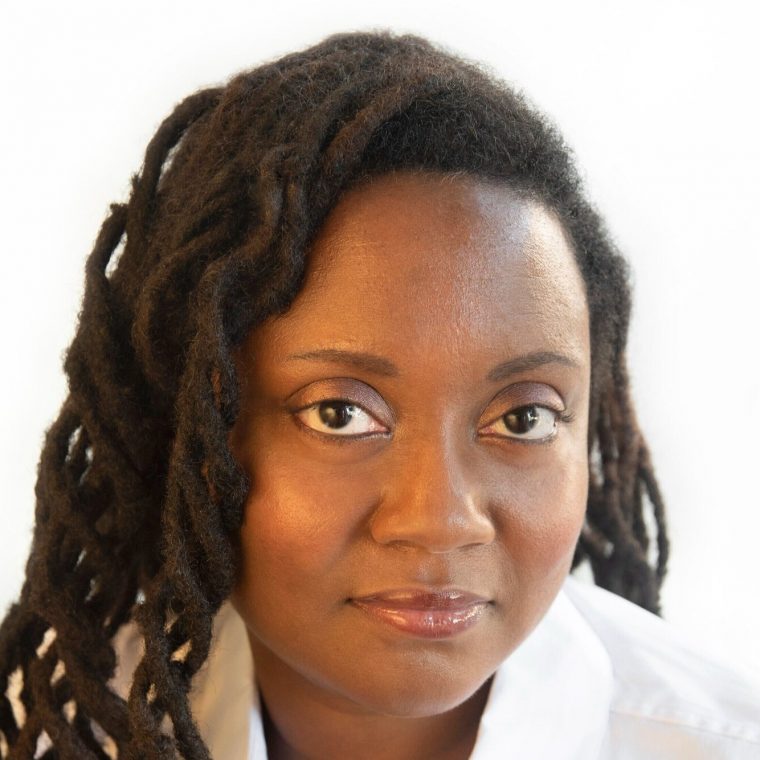
Brenda Sanders
2021 Food Justice Award
Brenda Sanders is the recipient of the FS Food Justice Award which recognizes individuals who work to challenge systemic barriers in the pursuit of creating a just and equitable food system.
For decades, Sanders has been committed to food justice, community empowerment, and compassionate advocacy in the City of Baltimore and beyond. Her virtuous and inspiring work has made a lasting impact on countless lives.
Brenda Sanders is a vegan food justice activist in Baltimore City who Co-Founded Thrive Baltimore, a community resource center that offers classes, workshops, cooking demos and other programming that supports people in living a healthier, more sustainable lifestyle. She’s also the founder and Executive Director of Afro-Vegan Society, a nonprofit organization that provides education and resources to people in marginalized communities to assist them in transitioning to veganism, Co-Creator of Vegan SoulFest, an annual festival that celebrates culture and all aspects of vegan living and Co-Owner of The Greener Kitchen, a vegan deli and food distributor that produces plant-based foods that are both affordable and accessible.
Brenda Sanders is the recipient of the FS Food Justice Award which recognizes individuals who work to challenge systemic barriers in the pursuit of creating a just and equitable food system.
For decades, Sanders has been committed to food justice, community empowerment, and compassionate advocacy in the City of Baltimore and beyond. Her virtuous and inspiring work has made a lasting impact on countless lives.
Brenda Sanders is a vegan food justice activist in Baltimore City who Co-Founded Thrive Baltimore, a community resource center that offers classes, workshops, cooking demos and other programming that supports people in living a healthier, more sustainable lifestyle. She’s also the founder and Executive Director of Afro-Vegan Society, a nonprofit organization that provides education and resources to people in marginalized communities to assist them in transitioning to veganism, Co-Creator of Vegan SoulFest, an annual festival that celebrates culture and all aspects of vegan living and Co-Owner of The Greener Kitchen, a vegan deli and food distributor that produces plant-based foods that are both affordable and accessible.


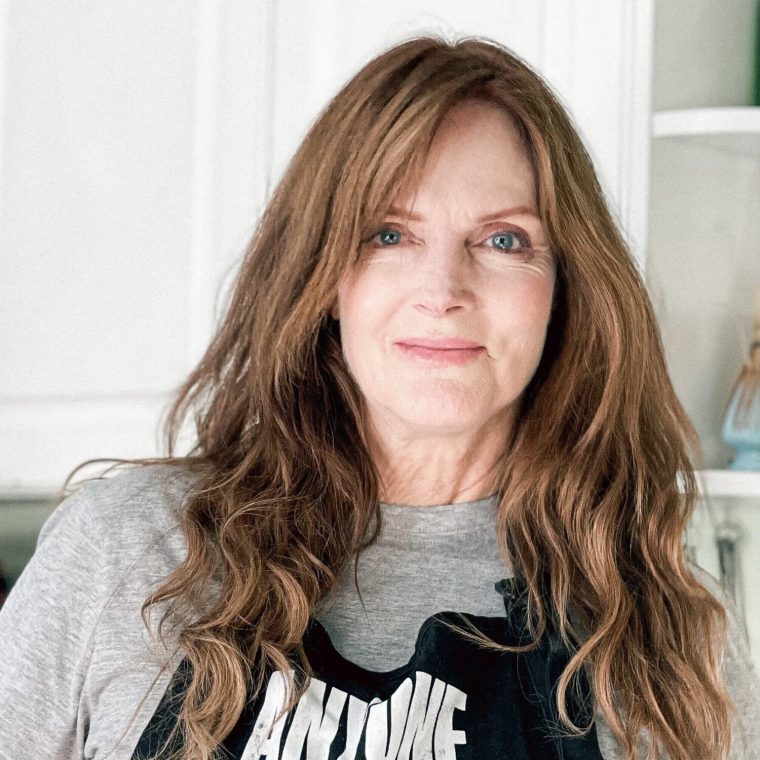
Maggie Baird
2021 Compassionate Community Award



Maggie Baird
2021 Compassionate Community Award
Maggie Baird is the recipient of the FS Compassionate Community Award which recognizes individuals who are dedicated to the unification of social movements and collective advocacy in their communities.
Baird works to combat food insecurity and positively impact the climate crisis by providing plant-based meals prepared by local restaurants to underserved communities while building awareness of the benefits of a plant-based diet.
Maggie Baird answered a need through the creation of Support + Feed at the height of the Covid 19 pandemic—by galvanizing a bold team of benevolent advocates from all walks of life with the sole mission of nourishing those experiencing food insecurity, while energizing and strengthening mission-driven local restaurants. This tenacious, multi-pronged grassroots movement not only made our community stronger in the face of a global pandemic, but it was so deeply rooted in compassion that it sprouted inspiration and action around the world.
Maggie Baird is the recipient of the FS Compassionate Community Award which recognizes individuals who are dedicated to the unification of social movements and collective advocacy in their communities.
Baird works to combat food insecurity and positively impact the climate crisis by providing plant-based meals prepared by local restaurants to underserved communities while building awareness of the benefits of a plant-based diet.
Maggie Baird answered a need through the creation of Support + Feed at the height of the Covid 19 pandemic—by galvanizing a bold team of benevolent advocates from all walks of life with the sole mission of nourishing those experiencing food insecurity, while energizing and strengthening mission-driven local restaurants. This tenacious, multi-pronged grassroots movement not only made our community stronger in the face of a global pandemic, but it was so deeply rooted in compassion that it sprouted inspiration and action around the world.
Special Guests


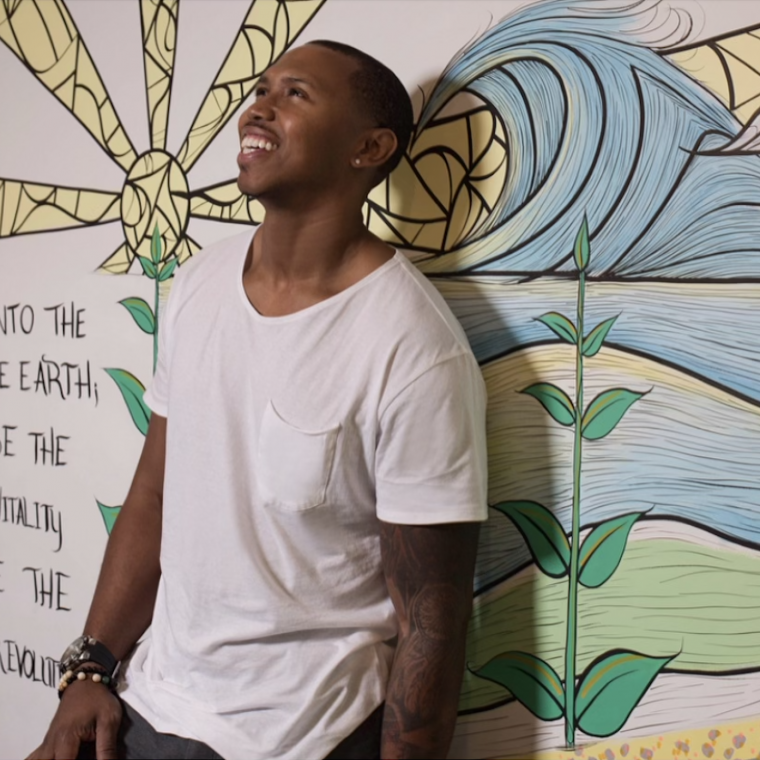
John Lewis



John Lewis
At a young age of 13, John found himself at 315 pounds, but through hard work and dedication, he lost weight and excelled in football and basketball. He continued his streak of athletic excellence throughout his high school and college years with a full-ride scholarship to Harris-Stowe State College. Graduating with a Bachelors’s degree in marketing, he later went on to pursue his MBA from Nova Southeastern University in Fort Lauderdale, FL.
John’s education in business coupled with his love for health and fitness gave him the ability to start his venture – Badass Vegan – a health and nutrition company that strives to educate individuals on plant-based nutrition. John’s love for his community brought forth the brainchild of “VeganSmart”, a plant-based protein shake company with a foundation whose mission is to prevent obesity through education, physical activity, and plant-based nutrition.
As a well-renowned fitness expert, John Lewis has spent over 2 decades in the health and fitness industry and played Division I college basketball. John is highly passionate about not only his own health and fitness but that of others as well… This is evident through his motivational messages either through his international public speaking engagements or simply through his social media outlets.
Today, John has taken his passion for health and is now directing his first feature-length documentary focused on food and social justice. John has teamed up with the maker of the award-winning “What The Health” to create their joint venture “THEY’RE TRYING TO KILL US”.
At a young age of 13, John found himself at 315 pounds, but through hard work and dedication, he lost weight and excelled in football and basketball. He continued his streak of athletic excellence throughout his high school and college years with a full-ride scholarship to Harris-Stowe State College. Graduating with a Bachelors’s degree in marketing, he later went on to pursue his MBA from Nova Southeastern University in Fort Lauderdale, FL.
John’s education in business coupled with his love for health and fitness gave him the ability to start his venture – Badass Vegan – a health and nutrition company that strives to educate individuals on plant-based nutrition. John’s love for his community brought forth the brainchild of “VeganSmart”, a plant-based protein shake company with a foundation whose mission is to prevent obesity through education, physical activity, and plant-based nutrition.
As a well-renowned fitness expert, John Lewis has spent over 2 decades in the health and fitness industry and played Division I college basketball. John is highly passionate about not only his own health and fitness but that of others as well… This is evident through his motivational messages either through his international public speaking engagements or simply through his social media outlets.
Today, John has taken his passion for health and is now directing his first feature-length documentary focused on food and social justice. John has teamed up with the maker of the award-winning “What The Health” to create their joint venture “THEY’RE TRYING TO KILL US”.



Rooney Mara



Rooney Mara


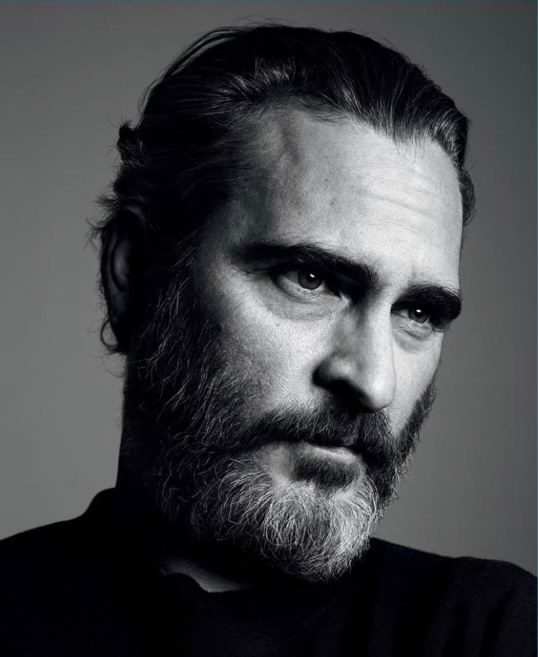
Joaquin Phoenix



Joaquin Phoenix


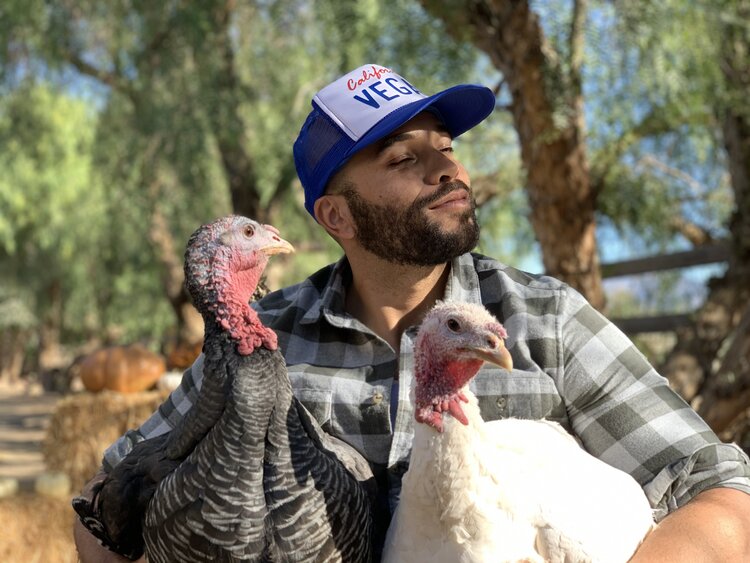
Dominick Thompson



Dominick Thompson
Dominick Thompson is a leader in the vegan and health and wellness communities. He is also the founder of multiple small startups including Eat What Elephants Eat, a successful food and nutrition company making plant-based eating accessible and affordable for everyone worldwide.
Prior to his current role as a social entrepreneur and activist, he was a working professional and executive in healthcare for 15 plus years and responsible for the business development and management of critical relationships with hospital systems and other provider types delivering services to both small and large communities throughout the eastern region of the United States. He achieved this role as a working professional after turning his life around while serving time in prison for dealing drugs as a means to get out humble beginnings.
Dominick is not one to shy about his humble beginnings and history being a former gang member and drug dealer. He speaks openly on it via his platforms and keynotes and its because of this honest transparency, Dominick has received global recognition and has been featured in NPR News, ABC News, Facebook Watch, Men’s Health Magazine, Men’s Muscle and Fitness Magazine, Esquire, Thrillist, Triathlete magazine, bodybuilding.com, and more.
His social media platforms together are strong and they continue to grow while producing some of the most inspiring, impactful content to hundreds of thousands of followers.
Dominick Thompson is a leader in the vegan and health and wellness communities. He is also the founder of multiple small startups including Eat What Elephants Eat, a successful food and nutrition company making plant-based eating accessible and affordable for everyone worldwide.
Prior to his current role as a social entrepreneur and activist, he was a working professional and executive in healthcare for 15 plus years and responsible for the business development and management of critical relationships with hospital systems and other provider types delivering services to both small and large communities throughout the eastern region of the United States. He achieved this role as a working professional after turning his life around while serving time in prison for dealing drugs as a means to get out humble beginnings.
Dominick is not one to shy about his humble beginnings and history being a former gang member and drug dealer. He speaks openly on it via his platforms and keynotes and its because of this honest transparency, Dominick has received global recognition and has been featured in NPR News, ABC News, Facebook Watch, Men’s Health Magazine, Men’s Muscle and Fitness Magazine, Esquire, Thrillist, Triathlete magazine, bodybuilding.com, and more.
His social media platforms together are strong and they continue to grow while producing some of the most inspiring, impactful content to hundreds of thousands of followers.


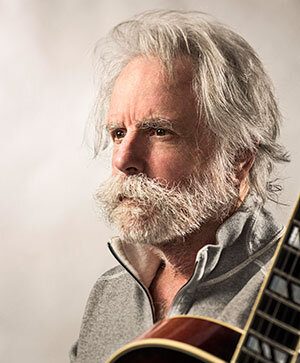
Bob Weir



Bob Weir
Bob Weir is one of the founding members of the legendary Grateful Dead. Since establishing the band in 1965, Weir has become one of rock’s finest and most distinctive rhythm guitarists. The band has received a GRAMMY Lifetime Achievement Award and appeared on Forbes’ list of top-grossing entertainers. The Grateful Dead is still one of the highest-grossing concert attractions in the US and their final tally of 2,318 total concerts remains a world record.
Weir has been honored with Lifetime Achievement Award from the Americana Music Association and is also a Les Paul Spirit Award recipient. Weir has teamed up with the United Nations Development Program (UNDP) as a Goodwill Ambassador to raise awareness and mobilize support for the UN agency’s work to end poverty while fighting climate change.
Bob Weir is one of the founding members of the legendary Grateful Dead. Since establishing the band in 1965, Weir has become one of rock’s finest and most distinctive rhythm guitarists. The band has received a GRAMMY Lifetime Achievement Award and appeared on Forbes’ list of top-grossing entertainers. The Grateful Dead is still one of the highest-grossing concert attractions in the US and their final tally of 2,318 total concerts remains a world record.
Weir has been honored with Lifetime Achievement Award from the Americana Music Association and is also a Les Paul Spirit Award recipient. Weir has teamed up with the United Nations Development Program (UNDP) as a Goodwill Ambassador to raise awareness and mobilize support for the UN agency’s work to end poverty while fighting climate change.



Paul Wesley



Paul Wesley
Paul Wesley is an actor, director, activist, and entrepreneur. Best known for his role on fan-favorite TV show, The Vampire Diaries, Paul regularly uses his powerful platform to advocate for farm animal welfare, the planet and a vegan lifestyle. Through his founding role in the whiskey brand, Brothers Bond, he is working to reverse climate change by giving back a portion of the proceeds to support regenerative farming practices. These practices will fundamentally change how large-scale agriculture and farming is done in the United States.
Paul Wesley is an actor, director, activist, and entrepreneur. Best known for his role on fan-favorite TV show, The Vampire Diaries, Paul regularly uses his powerful platform to advocate for farm animal welfare, the planet and a vegan lifestyle. Through his founding role in the whiskey brand, Brothers Bond, he is working to reverse climate change by giving back a portion of the proceeds to support regenerative farming practices. These practices will fundamentally change how large-scale agriculture and farming is done in the United States.
With appearances by...



Alec Baldwin



Alec Baldwin


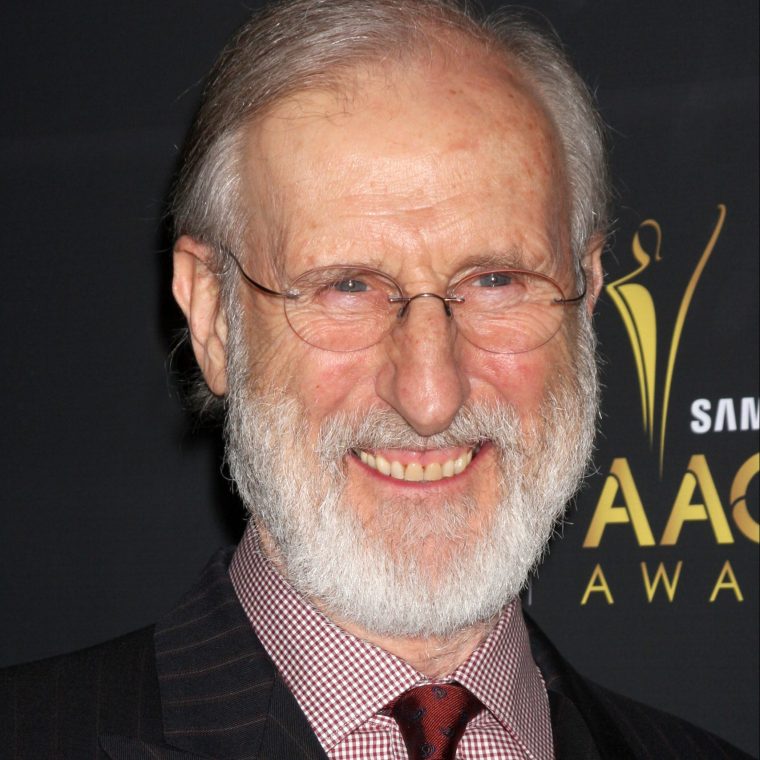
James Cromwell



James Cromwell


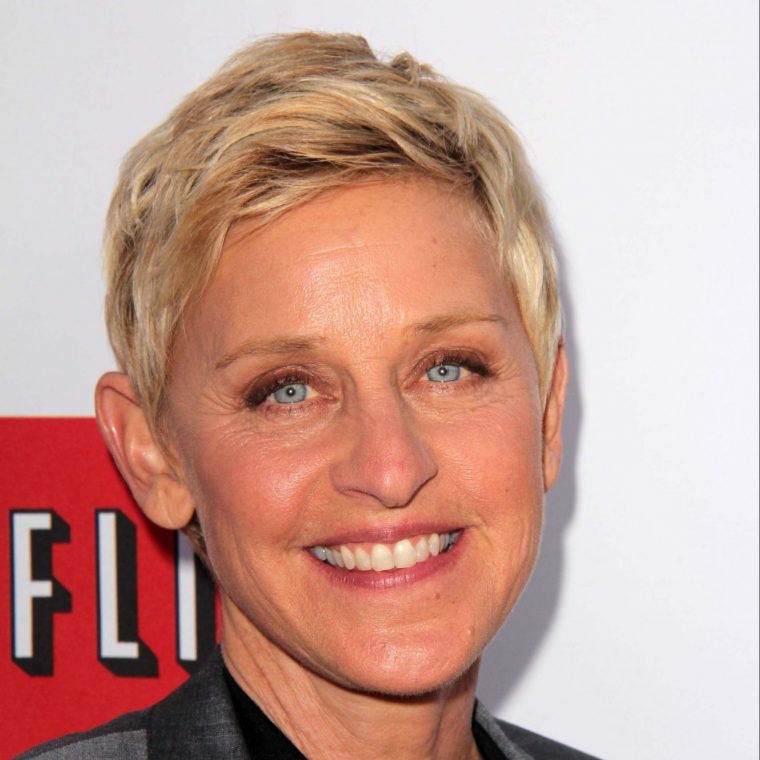
Ellen DeGeneres



Ellen DeGeneres


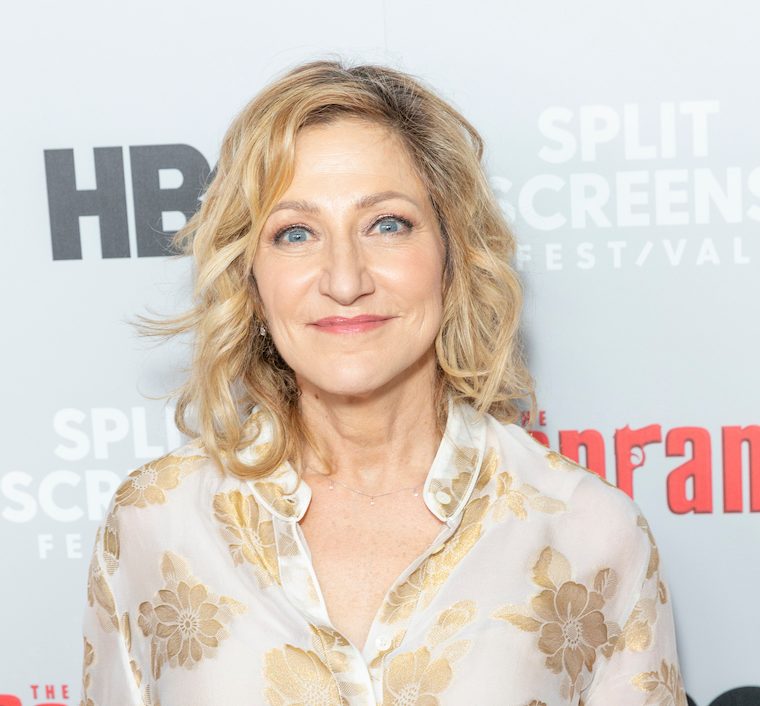
Edie Falco



Edie Falco


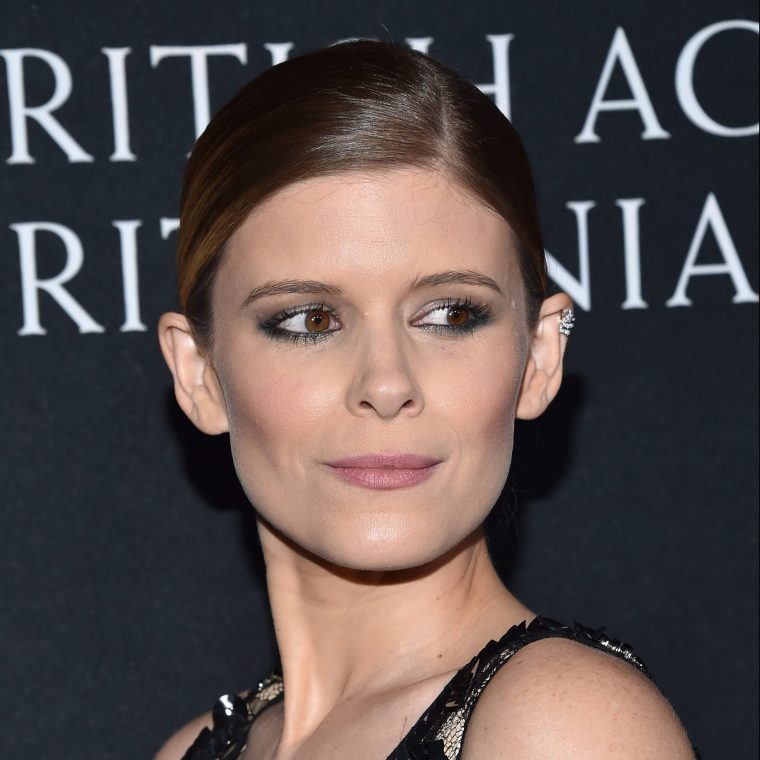
Kate Mara



Kate Mara


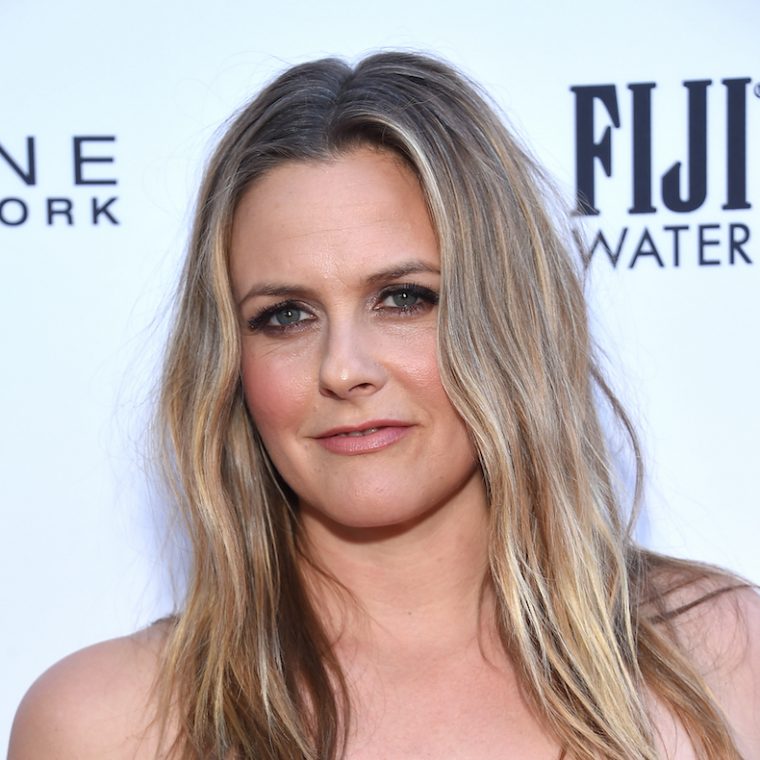
Alicia Silverstone



Alicia Silverstone


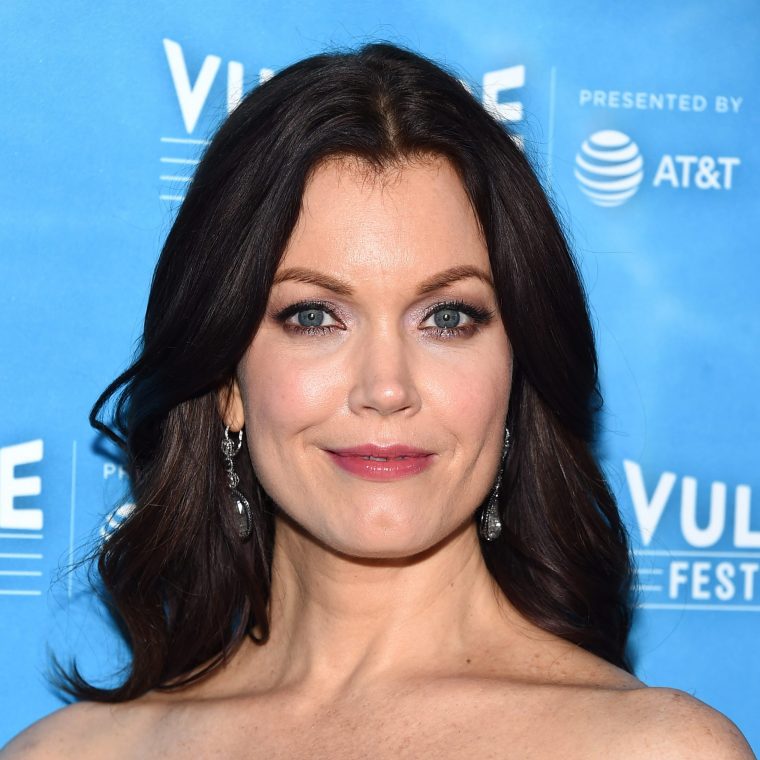
Bellamy Young



Bellamy Young
Alec Baldwin Photo: Tinseltown / Shutterstock.com





